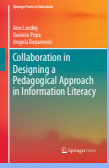
e-BOOK
Collaborative Curriculum Design for Sustainable Innovation and Teacher Learning
Sound curriculum design practices are necessary conditions for a curriculum that is relevant and based on up-to-date knowledge of teaching and learning. There is large agreement on the importance of teachers’ active involvement in curriculum design for deep and sustainable educational change. While teacher involvement in curriculum design offers multiple advantages, it presents various challenges as well. From a practical perspective, teachers need to understand the curriculum design process and develop design competencies. From a scholarly perspective, there is a need to rethink what curriculum design entails: from a systematic endeavor carried out by professionals to a more intuitive process carried out by (teams of) teachers. The chapters in this book contribute to an in-depth insight into what it takes to actively involve teachers in the curriculum design process. Specifically, the various chapters examine different aspects of teacher involvement in collaborative curriculum design, with specific attention to its implications for sustainable curriculum innovation and teacher learning. Curriculum innovation is framed in an international context and within broader educational reform issues, paying specific attention to the implications of collaborative curriculum design for sustainable innovation and teacher learning across diverse contexts. The book is organized into six sections. Section 1 introduces the notion of collaborative curriculum design by discussing its historical and theoretical foundations, as well as various approaches commonly adopted to actively involve teachers in the (co-)design of curriculum materials. Sections 2 and 3 provide examples of how key phases in the curriculum design process (i.e., needs analysis, design and development, implementation) look like across various collaborative curriculum design projects and discuss the challenges associated with supporting and investigating such processes. The chapters in Section 4 report on the impact of collaborative curriculum design on student learning, teacher practices, teacher professional growth, and institutional change. Building on the research evidence about the outcomes of collaborative curriculum design, the chapters in Section 5 focus on sustainability,
scaling-up, and curriculum leadership issues, which are key to the continuation and further evolution of curriculum innovations.
Ketersediaan
| 063 | 375 | Website | Tersedia |
Informasi Detail
- Judul Seri
-
-
- No. Panggil
-
375
- Penerbit
- Switzerland : Springer., 2019
- Deskripsi Fisik
-
xii, 424 hlm.
- Bahasa
-
Inggris
- ISBN/ISSN
-
978-3-030-20062-6
- Klasifikasi
-
375
- Tipe Isi
-
-
- Tipe Media
-
-
- Tipe Pembawa
-
-
- Edisi
-
-
- Subjek
- Info Detail Spesifik
-
-
- Pernyataan Tanggungjawab
-
Jules Pieters
Versi lain/terkait
Tidak tersedia versi lain
Lampiran Berkas
Komentar
Anda harus login sebelum memberikan komentar
 Karya Umum
Karya Umum  Filsafat
Filsafat  Agama
Agama  Ilmu-ilmu Sosial
Ilmu-ilmu Sosial  Bahasa
Bahasa  Ilmu-ilmu Murni
Ilmu-ilmu Murni  Ilmu-ilmu Terapan
Ilmu-ilmu Terapan  Kesenian, Hiburan, dan Olahraga
Kesenian, Hiburan, dan Olahraga  Kesusastraan
Kesusastraan  Geografi dan Sejarah
Geografi dan Sejarah